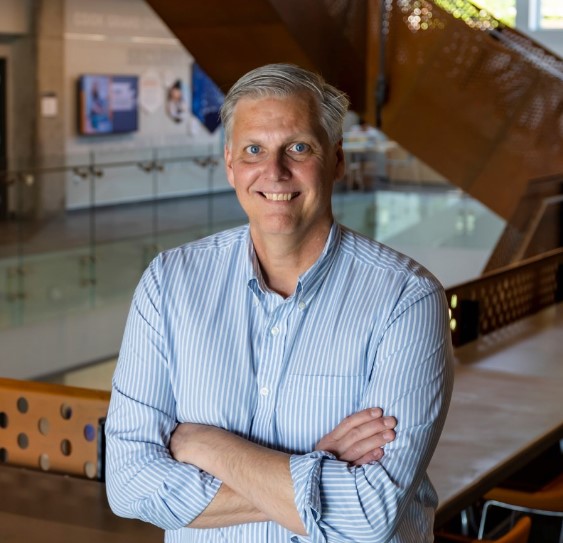
UT: bdwirth@utk.edu
ORNL: wirthbd@ornl.gov
Brian Wirth grew up in Montana near Malmstrom Air Force Base and its silo of Minuteman missiles. Going to high school during the height of the Cold War, Wirth credits a physics teacher with fueling his desire to pursue nuclear engineering as a career.
Today, Wirth—the UT-ORNL Governor’s Chair in Computational Nuclear Engineering—is an authority on the ways materials behave in extreme environments. He studies nuclear energy environments and materials with the goal of producing the safest nuclear energy possible while extending the life of the components and their materials, and the nuclear fission or fusion reactor itself.
Using high-performance computational modeling and experimental processing, Wirth and his team study the structure and properties of materials, looking for defects that might impair reactor performance. The goal is to assess the components’ reliability and to develop advanced, new materials with revolutionary improvements in properties and performance.
Among Wirth’s current projects is using machine learning to better understand fusion materials. The work is funded by a grant from the Department of Energy (DOE) Office of Fusion Energy. The DOE’s Office of Nuclear Energy and the Office of Advanced Scientific Computing Research have funded other aspects of his work.
“ORNL and UT are clearly at the center of significant investment in nuclear technology in the East Tennessee Technology Corridor, with an opportunity for further expansion,” Wirth said, noting that there are more than 150 companies involved with nuclear energy technology work within 50 miles of Oak Ridge and Knoxville with “significant opportunity to grow many dozens of companies in this area supporting the rapidly expanding fusion energy and technology industry.”
Wirth, who was named a Governor’s Chair when he came to UT in 2010, participated in the DOE’s Modeling and Simulation Hub for nuclear power, known as the Consortium for the Advanced Simulation of Light Water Reactors, (CASL). He has led a decades-long Scientific Discovery through Advanced Computing (SciDAC) project on developing high-fidelity advanced simulation tools for predicting plasma-surface interactions in the fusion energy environment.
In 2015, Wirth was one of nine researchers across the country awarded the DOE’s prestigious Ernest Orlando Lawrence Award for his research supporting science, energy, and national security. His other awards include the 2016 Mishima Award for outstanding research in nuclear fuels and materials from the American Nuclear Society, the 2007 Fusion Power Associates David J. Rose Excellence in Fusion Engineering Award, and the 2004 Presidential Early Career Award for Scientists and Engineers (PECASE). He is an elected fellow of the American Association for the Advancement of Science and the American Nuclear Society.
Wirth is also part of the 2023-24 class of the Chancellor’s Leadership Academy, an eight-month leadership development program for UT faculty and staff.
Wirth earned his doctorate in mechanical engineering at the University of California, Santa Barbara, where he was a DOE Nuclear Engineering Graduate Fellow. He earned a bachelor’s degree in nuclear engineering with highest honors from the Georgia Institute of Technology.
Before coming to UT, Wirth was on the faculty at the University of California, Berkeley, and worked as a materials scientist at Lawrence Livermore National Laboratory.
Wirth and his wife, Christine Martin, have two sons.
When he’s not working, Wirth enjoys hiking and is a “sports nut” who cheers for the Atlanta Braves and loves college sports. An avid cook, he became a dedicated sourdough baker during the pandemic and, for several years, has joined forces with a colleague on a whole hog roast prior to the UT-Alabama football game.
The UT-Oak Ridge Innovation Institute oversees the UT-ORNL Governor’s Chair program, as well as UT and ORNL’s other joint research, education and workforce development efforts.
